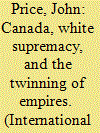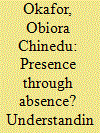| Srl | Item |
| 1 |
ID:
124733


|
|
|
|
|
| Publication |
2013.
|
| Summary/Abstract |
Taking a transnational approach, this essay explores the dynamic circuits of global racisms, resistance, and imperial politics that obliged Canadian policymakers to secure racist exclusions while simultaneously obscuring them. The case studies examined in this essay-British Columbia's denial of the franchise to First Nations and Chinese, adoption of the Natal Act, and the comprehensive federal exclusions adopted after the 1907 white race riots in Vancouver-illustrate how racist immigration policies, both provincial and federal, had to take into account resistance and international factors as perceived by the British Colonial Office. Taken in conjunction with Indigenous history, the history of transpacific migration to Canada offers important insights into the role of white supremacy in a colonial settler state such as Canada.
|
|
|
|
|
|
|
|
|
|
|
|
|
|
|
|
| 2 |
ID:
178006


|
|
|
|
|
| Summary/Abstract |
This study examines the African Human Rights Action Plan (AHRAP) through the lens of Upendra Baxi's germinal theory on the emergence in our time of a ‘trade-related, market-friendly human rights’ (TREMF) thesis that is challenging the specific understandings of ‘people-centric’ human rights that are predicated in the letter and spirit of the Universal Declaration of Human Rights (UDH). Baxi contends, instead, that the dominant strands of the contemporary understandings of human rights are – for the most part – designed to protect the interests of global capital. That said, human rights frameworks in low-income countries need to be studied with a view to what they say and don't say about global capital. Despite its attempt to facilitate a progressive realisation of human rights in Africa, the AHRAP does not rise far enough above the TREMF paradigm to re-locate itself within the UDH one. This is due to the AHRAP not adequately theorising and analysing the role of capital in the (non)realisation of human rights in Africa. By allowing trade and market practices to slip to a significant extent beyond its purview, the AHRAP privileges – to a significant degree – the needs/interests of capital over the human rights of ordinary Africans. That is, the victims of the excesses of capital in Africa are reincarnated in the AHRAP document by the fact of their exclusion from it.
|
|
|
|
|
|
|
|
|
|
|
|
|
|
|
|